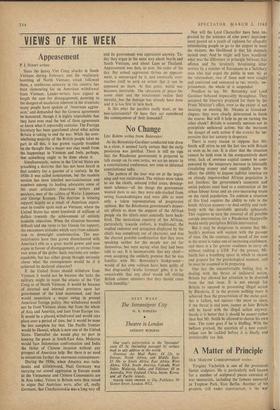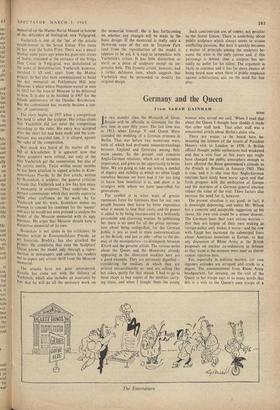A Matter of Principle
OUR MOSCOW CORRESPONDENT writes:
Yevgeny Vuchetich is one of the prominent Soviet sculptors. He is particularly well known for a number of sculptural pieces executed as war memorials, including the famous memorial in Treptow Park,- East Berlin. Another of his projects, still under construction, is the war he has won the Stalin Prize. There was a minor mishap some years ago when his giant-size statue of Stalin. stationed at the entrance ot the Volga Don Canal in Volgograd, was demolished in the wake of destalinisation. Vuchetich, however, survived it all and, apart from the Mamai Project, he has also been commissioned to build the war memorial on Poklonnaya Hill. near Moscow, a place where Napoleon waited in vain in 1812 for the keys of Moscow to be delivered (0 him. It is due to be finished in .1967 for the fiftieth anniversary of the October Revolution. Rut the commission has recently become a sub- ject of controversy.
The story begins in 1957 when a competition Was held to select the sculptor. His critics claim that Vuchetich did not enter the competition according to the rules. His entry was accepted after the short list had been made and the cum- mission was awarded him, it is alleged, against the rules of the competition.
Not much was heard of the matter till the fall of Khrushchev. It is apparent now that Many sculptors were critical, not only of the Way Vuchetich got the commission, but also of his artistic merits. Twice within recent months
he has been attacked in signed articles in Kom- samolskaya Pravda. In the first article, written by lkonnikov, a sculptor, the general criticism
is made that Vuchetich and a few like him enjoy a monopoly in sculpture. They undertake im- Portant commissions which they merely supervise While other craftsmen do the work. As for Vuchetich and his work, Ikonnikov makes no attempt to conceal his contempt fot the `master' and says he would not even pretend to analyse the model of the Moscow memorial with its ugly mistakes. He urges that Moscow should have a distinctive memorial of its own.
lkonnikov is not alone in his criticisms. In another article in Komsomolskaya Pravda, an
art historian, Brodsky, has also attacked the Project. He complains that even the Sculptors' Union knows the model Only through a repro- duction in newspapers and advises his readers llot to expect any artistic thrill from the Moscow Memorial.
The attacks have not gone unanswered. IZvestia has come out with the defence of
Vuchetich, which also includes an assurance by him that he will do all the necessary work on
the memorial himself. He is less forthcoming on whether any changes will be made in the basic design. If the memorial is really only a blown-up copy of the one in Treptow Park (and from the reproduction of the model it appears to be so), it is easy to sympathise with Vuchetich's critics. It has little distinction or merit as a piece of sculpture except its im- pressive bulk. The /zvesiia article, however, had a rather defensive tone, which suggests that Vuchetich may be persuaded to modify his original design. Such controversies are, of court:. not peculiar to the Soviet Union. There is something about public sculpture which always seems to arouse conflicting passions. But here it quickly becomes a matter of principle among the sculptors be- cause the state• is the only patron and, if this patronage is denied, then a sculptor has vir- tually no outlet for his talent. The argument is likely to continue and it has far more chance of being heard now when there is public emphasis against arbitrariness and on the need for fair play.



































 Previous page
Previous page